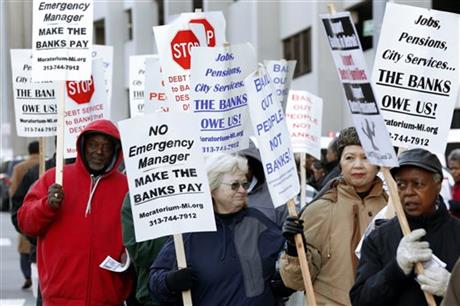
By ED WHITE
Protesters rally outside The Theodore Levin United States Courthouse in Detroit, Wednesday, Oct. 23, 2013. The city of Detroit for months has disclosed the awful condition of its finances. Now it’s up to a judge to determine if the largest public bankruptcy in U.S. history really can go forward. An unusual trial starts Wednesday, pitting Detroit’s emergency manager and his legal team against unions and pension funds that claim the city isn’t qualified to scrub its books clean under Chapter 9 bankruptcy. (AP Photo/Paul Sancya)
DETROIT (AP) — The city of Detroit has assets that might bring in much-needed cash, but any deals wouldn’t solve long-term problems with pensions and other obligations, a financial analyst testified Thursday at a bankruptcy trial.
“Those are one-time proceeds,” Gaurav Malhotra of Ernst & Young said under cross-examination by union lawyers on the second day of trial.
Detroit is trying to convince a judge that it’s broke and negotiated in good faith with key creditors before filing for Chapter 9 protection in July. If the city isn’t eligible to be in bankruptcy court, it would lose the upper hand to restructure $18 billion in debt.
Unions and pension funds with much at risk in the bankruptcy claim Detroit isn’t eligible. They accuse emergency manager Kevyn Orr of holding half-hearted talks while plotting the largest public bankruptcy in U.S. history.
Malhotra, who has performed financial analysis for Detroit since 2011, acknowledged that the city has drawn up a list of assets that might attract investors, including a small airport, Joe Louis Arena and the city’s stake in a tunnel to Windsor, Ontario. But none, he said, would provide long-term financial relief.
Meanwhile, efforts to preserve cash mostly were limited to deferring payments to city pension funds, Malhotra testified.
The second witness, Charles Moore, a turnaround specialist from the Detroit-area firm Conway MacKenzie, talked about his experiences at City Hall.
“A number of departments were severely broken … unable to perform basic functions,” he said.
Moore said it would cost $500 million over six years to knock down blighted or abandoned buildings and improve vacant properties.
Police Chief James Craig was expected to testify about the impact of Detroit’s poor finances on public safety. Orr also will be a witness, along with Michigan Gov. Rick Snyder, who approved the bankruptcy filing.
A decision on Detroit’s eligibility appears to be weeks away. The trial could end next week, but Judge Steven Rhodes has set a Nov. 13 deadline for lawyers to file legal briefs on certain issues.


